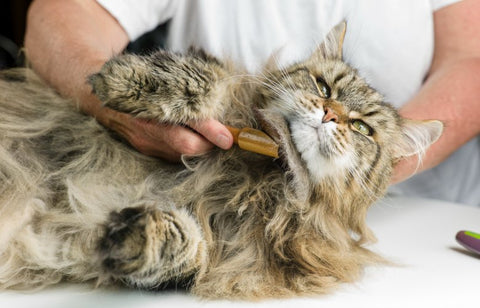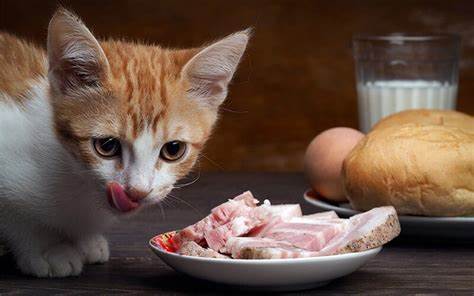1.Understanding Cat Grooming
Before delving into the dietary aspects, let's first understand the significance of grooming in a cat's life. Grooming is not just about keeping their fur clean and untangled; it serves several vital functions:

Temperature Regulation: Cats regulate their body temperature through grooming. When they lick themselves, the saliva evaporates, providing a cooling effect. During the colder months, they fluff up their fur to trap air for insulation.
Cleanliness: Cats are meticulous about keeping themselves clean. By licking their fur, they remove dirt, debris, and parasites. This helps prevent skin infections and keeps their coat in excellent condition.
Stress Reduction: Grooming has a calming effect on cats. It helps them relax and reduces stress, which is vital for their emotional well-being.
Social Interaction: In a group of cats, grooming can be a social activity, signifying friendship and bonding.
Given the importance of grooming, it's clear that maintaining healthy skin and fur is a top priority for your cat. This is where diet comes into play.
2.Nutrients for Healthy Fur and Skin
A cat's diet should provide essential nutrients to support healthy fur and skin. Here are some key nutrients and their roles:
Protein: Cats are obligate carnivores, which means they require a high amount of protein in their diet. Protein is vital for the production of keratin, a protein that makes up their fur and helps maintain its strength and texture.
Fatty Acids: Omega-3 and omega-6 fatty acids play a crucial role in skin and coat health. They help reduce inflammation, prevent dry skin, and promote a shiny, healthy coat. Sources of these fatty acids include fish oil and specific plant-based oils.
Vitamins: Vitamins like A and E are essential for maintaining skin health. Vitamin A supports the growth of skin cells, while vitamin E acts as an antioxidant, protecting the skin from damage.
Minerals: Zinc, copper, and selenium are minerals that contribute to skin and coat health. They are involved in the production of keratin and play a role in wound healing and hair growth.
Water: Adequate hydration is vital for skin and fur health. Water keeps the skin moisturized and ensures the fur remains soft and glossy.
3.Common Dietary Imbalances
When a cat's diet lacks these essential nutrients, it can result in various health issues related to fur and skin:

Dull Coat: A lack of proper nutrients can lead to a dull, dry, and lackluster coat.
Hair Loss: Nutritional deficiencies can cause excessive shedding or even hair loss, leading to bald patches.
Dry Skin: Inadequate hydration and nutrients can result in dry, flaky skin that may lead to itching and discomfort for your cat.
Skin Infections: Without the necessary nutrients to support a healthy immune system, your cat is more susceptible to skin infections, which can be painful and challenging to treat.
Excessive Grooming: Ironically, a poor diet can lead to over-grooming. Cats may lick themselves excessively when experiencing skin irritation or discomfort, which can exacerbate the problem.
4.Choosing the Right Cat Food
To ensure your cat's diet promotes healthy fur and skin, it's essential to select the right cat food. Here are some tips:
Consult Your Vet: Your veterinarian can recommend a diet that suits your cat's specific needs, considering factors like age, breed, and any existing health conditions.
Read Labels: Check the ingredient list on cat food labels. Look for high-quality protein sources and healthy fats. Avoid foods with excessive fillers and artificial additives.
Consider Supplements: If your vet recommends it, consider adding supplements like fish oil to your cat's diet to ensure they get enough omega-3 fatty acids.
Hydration: Ensure your cat has access to fresh, clean water at all times. Proper hydration is essential for skin and coat health.
Variety: Cats can get bored with their food, so consider offering a variety of high-quality cat foods to keep their diet interesting.

Conclusion
A balanced diet is a fundamental component of cat grooming. It plays a significant role in maintaining healthy fur and skin, which are essential for your cat's overall well-being. To ensure your cat's dietary needs are met, consult your veterinarian, select high-quality cat food, and pay attention to the ingredients. With the right diet, you'll be supporting your feline friend's grooming routine and helping them maintain a shiny, healthy coat and soft, supple skin.
